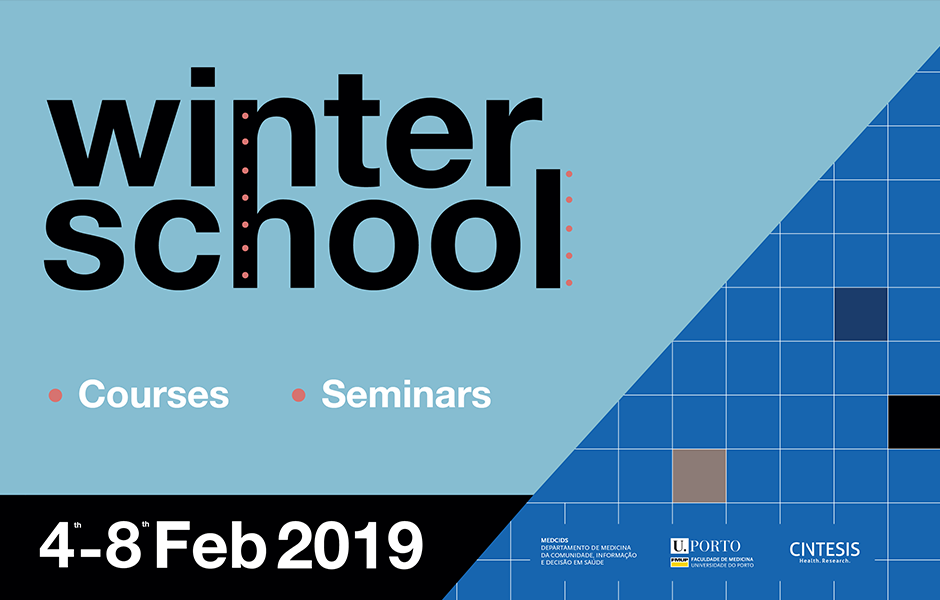The Winter School 2019, organized by MEDCIDS – Department of Community Medicine, Health Information and Decision of the Faculty of Medicine of the University of Porto (FMUP), with the support of CINTESIS – Center for Health Technology and Services Research, has been scheduled.
The first edition of this Winter School, features eight courses and four seminars scheduled for the week of February 4-8, 2019, at CIM – Centro de Investigação Médica (Center for Medical Research) of FMUP. The number of places per course is limited to 30 admissions.
These are the Winter School 2019 courses: Introduction to Biomedical Data Analysis Using R; Health Data Analysis: from Theory to Practice; Biostatistics: Linear and Logistic Regression; Evidence Synthesis – Systematic Reviews and Meta-Analysis; Microsoft Excel for Biomedical Data Analysis; MATLAB: Introduction and Applications; QGIS Initiation e R Programming Language Introduction.
The seminars focus on “Translation and Validation of Questionnaires”, “Sample Size Estimation”, “Ethics in Scientific Research”, and“Media Training”; and are scheduled for February 4, 5, 6 and 7, respectively.
The Winter School 2019 aims at training professionals in key areas that are in deficit in enterprises and universities, and that have high social and business value, the reason for such institutions to be willing to receive researchers interested in working in these areas. The target audience includes professionals, researchers and students from the Health, Information Sciences, Engineering, Mathematics and Statistics, and Social Sciences who wish to develop or gain skills in Data Analysis, Clinical Research or Health Services.
The course Introduction to Biomedical Data Analysis using R aims to provide students with basic skills on Health Data Sciences. Specifically, on the exploratory and inferential analysis of biomedical data component, including the application of different basic statistics techniques to medical data using real databases and the software R. The call for application open on November 12 and will run until December 12.
The course on Health Data Analysis: from Theory to Practice aims at teaching skills related to protocol definition, data preprocessing and initial exploration, as well as pre-processing and initial exploration of data, as well as data modeling and evaluation of the models produced regarding the usefulness and possible impact.
Essentially addressed to researchers and health professionals, the Biostatistics: Linear and Logistic Regression will approach regression analysis in the Health area, providing the students with basic knowledge on the use of this type of statistical methodologies and on the interpretation of results presented in scientific articles.
The Evidence Synthesis – Systematic Reviews and Meta-Analysis course focusses on methodological issues and basic practices involved in the implementation of evidence synthesis studies such as systematic reviews and Meta-Analysis in the field of Health Research.
The course on Microsoft Excel for Biomedical Data Analysis is also an option of the Winter School 2019. The objective of this course is to provides students, professionals and researchers with the data management and analysis skills using and exploring the potentialities of Microsoft Excel.
The MATLAB: Introduction and Applications course, in turn, will discuss a high-level programming language and basic MATLAB® programming concepts, such as Import, Export, Data Processing and Visualization, which applied to different areas, namely, the development of medical devices tests, modeling of real-world phenomena, analysis of medical images, sound processing, monitoring of clinical parameters, among other.
The QGIS Initiation: applications in health course aims at getting the students acquainted with the Open Source concept, and provide them with the grounds to be able to manipulate cartographic data in the Open Source software QGIS. The students will also be provided with notions on how to implement and create plugins to contribute to the community that supports Open Source.
Last but not least, the R Programming Language Introduction for Life Scientists course aims at teaching basic R programming concepts, as well as types of data, loops and functions, which will enable the use of R as a statistical tool for data analysis in the respective professional context.
For further information, please check the following link:
Website: http://cides.med.up.pt/index.php/winter-school
Email: medcids@med.up.pt

